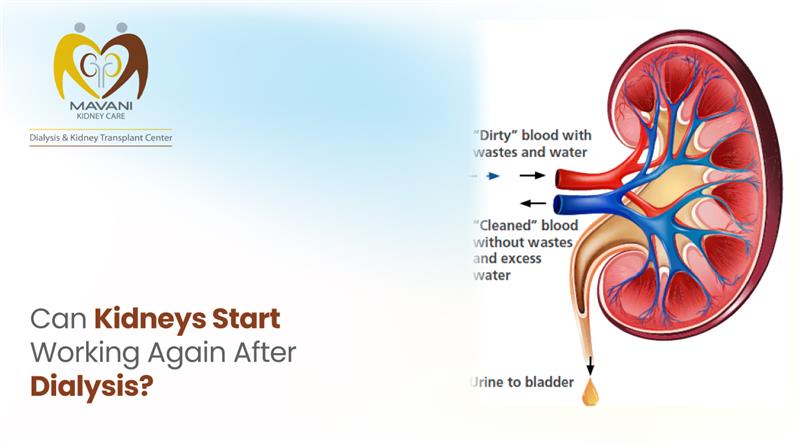If you are on dialysis or know someone who needs Dialysis Treatment in Ahmedabad, then you must visit Mavani Kidney Care. But whoever goes under dialysis, one must be wondering, “Can the kidneys start working again after dialysis?” It’s a natural question. After all, dialysis is a life-saving therapy, but it’s no match for your kidneys doing the work. We’re going to discuss it in a straightforward, no-frills manner without all that heavy medical jargon.

First, a Quick Recap: What Is Dialysis?
Your kidneys act like filters. They clear waste, balance fluids, form urine and help prevent and control problems related to body chemistry. When kidneys fail to function, waste and extra fluid accumulate in the body, and those substances can be toxic. That’s where dialysis comes in. It's an external machine that assumes the job of the kidneys and filters the blood.
So, here’s the big question: Once you’ve started dialysis, does that mean your kidneys are shot for the last time ever? Not necessarily.
Can Kidneys Bounce Back?
Here's the truth: that all depends on the cause of the kidney failure. Sometimes, kidneys are just temporarily out of service. With a good treatment, the kidneys may recover, said the poet, librarian and translator Imani Tolliver, whose kidney damage left her with end-stage renal disease, the most severe form of kidney failure.
This is where the query, Can kidneys start working again after dialysis? Comes to mind. Makes sense. When the damage is temporary, dialysis functions as a support system. It allows your body time to heal while the kidneys get themselves in order. Once the kidneys begin to work again, it might be possible to discontinue dialysis.
But if the kidney failure is chronic and damage has been occurring gradually over the years (as in diabetes, hypertension or polycystic kidney disease), recovery is less likely. For such cases, dialysis is a long-term answer, absent a kidney transplant.
Stories of Recovery Do Exist
It might shock you, but many people have come off dialysis after their kidneys have recovered function. Cut and dry. We rushed to the hospital, where they immediately rushed her into surgery since she was in total kidney failure.’Sometimes doctors have to initiate dialysis because the kidneys are failing, but by treating the underlying problem, the kidneys can recover slowly.
And when you think of it like that, dialysis is a “pause button” on your body. It relieves the stress on the kidneys as they heal. And if they do succeed, the dialysis machine can be turned off.
That said, it’s important to know that not everyone gets this happy ending. Kidney recovery after dialysis is possible, but it’s not guaranteed.
What Are the Factors That Increase the Likelihood of Recovery?
Here are a few factors that can make a big difference :
The reason for the kidney failure : Some temporary conditions have a better chance of being reversible than others.
General health status : Younger people and those without underlying health conditions fare better.
Early treatment : The earlier the diagnosis and treatment, the higher the chance for the kidneys to be treated.
Modifying lifestyle : Consuming a kidney-friendly diet, lowering blood pressure and blood sugar and potentially eliminating unnecessary medications can be helpful to recover.
So when people wonder, “Can kidneys start working again after dialysis?” the response can substantially vary depending on these factors.
Living With Hope and Realism
It is natural to want to cling to hope that your kidneys might bounce back. Physicians always verify signs of recovery before calling kidney damage permanent. Patients on dialysis are typically periodically tested to determine if there’s any return of kidney function.
But at the same time, it is important to keep it real. Chronic kidney failure implies permanent damage. In such instances, the kidneys need to “wake up.” Instead, focusing on dialysis or thinking about a transplant can provide the best quality of life.
Final Thoughts
So, let’s come around again for one last lap: can kidneys recover after going on dialysis? Yes, in some cases, they can, especially if the kidney issue is temporary. Dialysis can serve as a supportive bridge, allowing your body time to heal. But when kidney disease is chronic, the chances of recovery are much reduced, and dialysis or transplant is likely to be the main option.
Either way, being on dialysis isn’t a death sentence. With proper care, treatment and lifestyle changes, many people live full, active lives with kidney disease. For more information on that, you can visit Mavani Kidney Care.
